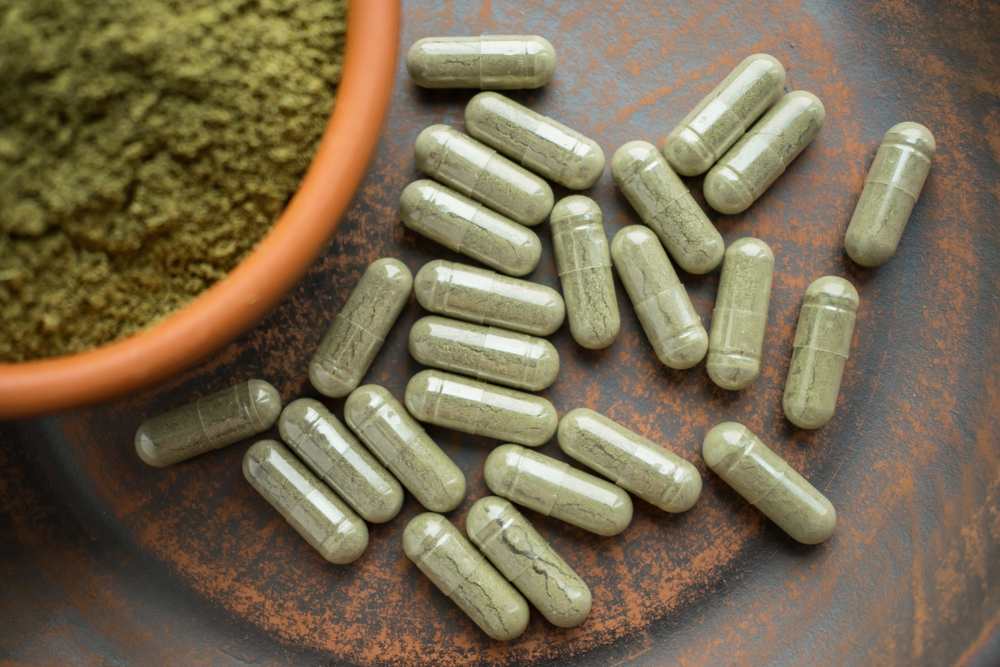If you’re concerned you or a loved one is struggling with Kratom contact us for help today.
Extracted from the leaves of a tropical plant found in Southeast Asia, kratom is known for its mind-altering effects. Currently, it is not considered an illegal or controlled substance and can easily be found online. When found online, it is often sold under “soap-making and aromatherapy” as the FDA has made the importation of kratom as a dietary supplement illegal. It can also be found in paraphernalia shops and gas stations across most regions of the U.S.
While kratom has long been used in Thailand for hundreds of years, targeting a range of ailments, recreational use in the U.S., and Europe has significantly increased since 2000. It is sold in powder form and can either be taken in capsules or it can be made into tea. There are even kratom bars that may be visited across the nation — with the majority beginning in Florida.
This is what makes kratom so dangerous. Many perceive it to be safe, and in some cases, even beneficial. However, the research shows otherwise. As reported by the Mayo Clinic and Drug Enforcement Administration, kratom is unsafe and ineffective.

Your personal experience when taking kratom will depend on how much you take. At low doses, kratom produces stimulant-like effects. These typically begin within 10 minutes of taking the drug and can last up to 90 minutes. While the majority of users find these effects pleasant, kratom does produce intense agitation and anxiety in some. At doses of approximately 1-5 grams, users tend to experience:
When taking larger doses (i.e. up to 15 grams), instead of having amphetamine-like effects, kratom begins to produce more opioid-like effects. These effects can be intense and last for hours. Once again, some users find the resulting high is an unpleasant experience. At higher doses, users experience pain reduction, drowsiness, and cough suppression.
While the above effects may sound desirable to some, kratom also produces a range of side effects. These side effects are dose-dependent and include:
While serious toxic effects appear to be rare, there is simply not enough research available on kratom. The majority of serious reactions occur following large doses (more than 15 grams). At these doses, seizures may occur. Since Thailand has long used kratom, some research has been conducted on the long-term effects of kratom abuse, showing a connection between chronic, high-dose kratom use and psychosis, as well as significant weight loss and hyperpigmentation. The longer you take kratom, the stronger your body’s dependence becomes, and the harder it will be to overcome a potential addiction.

Since kratom produces opioid-like effects, it can be addictive and in some cases, addiction treatment is required. Health officials are particularly concerned about teenagers, as kratom use is rising. Teenagers sometimes experiment based on the perceived high, while others begin taking kratom as a tea to help with anxiety, only to end up experiencing acute opioid withdrawal.
Since kratom isn’t necessarily a “street” drug like heroin or meth, and since it’s derived from a plant, many assume that it’s safe, but it’s not — it’s addictive. The issue is that it is so accessible and although many young adults are allured by the idea of kratom’s stimulant effects, once they begin to experience the substance’s opioid-like effects, the risk of addiction heightens.
If you’re concerned that your loved one is addicted to kratom, be mindful of the following signs:
As discussed above, kratom addiction can lead to withdrawal symptoms. Research shows that those who begin to crave kratom will often require treatment similar to the medical-assisted treatment for opioid addiction (i.e. the use of Narcan). That is why it’s important that you seek the support of a professional medical detox facility. This will significantly reduce your risk of relapse as you work through your recovery process.
Some of the greatest issues associated with kratom are that there is little control over this drug’s processing, packaging, growth, and labeling. By the time kratom reaches the U.S., there are numerous significant health concerns. Currently, kratom is listed on the DEA’s “Drugs and Chemicals of Concern” list.
While kratom is being used to treat everything from pain to opioid addiction (which is not recommended among medical professionals), the research shows that kratom is not safe. After William Eggleston, clinical assistant professor of pharmacy practice at Binghamton University began seeing an increase in patients experiencing kratom withdrawal and toxicity, he became curious.
William and his team conducted a review of kratom exposures reported to the National Poison Data System to better determine the associated toxicities of kratom use. They also reviewed records from a County Medical Examiner’s Office in New York. Here is what they found:

While kratom is not as strong as other opioids, a kratom addiction can be challenging to overcome. That is because there are a lot of substances present in kratom, creating a range of effects. This addiction requires a comprehensive approach — especially when kratom addiction is paired with a mental health disorder.
If you have been experimenting with kratom and it has become an issue, interfering with your life, it’s important to seek treatment. As reported by the NIDA, long-term kratom use can lead to withdrawal symptoms and psychiatric illness. Once you have become addicted, you will likely require support to overcome the addiction itself.
When you attend a professional treatment facility, you will be required to make social, emotional, behavioral, and physical changes. For many, when they try to take these steps on their own, it is overwhelming, especially when paired with withdrawal symptoms. That is why professional support is so effective, you are given the tools and resources you personally need to succeed.
By seeking professional treatment, you will be guided along your journey. You will gain access to the type of support system that will significantly enhance your ability to succeed. You no longer need to remain a slave to your addiction or negative thought patterns — help is available!
When you seek treatment for kratom addiction, the overall process is typically broken down into three phases. These include physical stabilization or kratom detox, therapy, and recovery. At Transformations, we will help guide you through each individual phase, providing you with the type of customized support and treatment you need to succeed.
During the first phase, you will enter a kratom detox program in a medical detox facility. This means that you can address your withdrawal symptoms by using medications while under medical supervision. This is the safest and most comfortable option.
Next, we will create a tailored treatment plan in regard to therapy and counseling. We often recommend a combination of individual and group therapy. You may also benefit from family therapy. The goal here is to help you heal in a more holistic manner. For example, many users begin taking kratom with the aim to self-treat their symptoms of depression or anxiety, when one should really look for a depression rehab program or anxiety disorder treatment.

At Transformations, we will help you address any underlying conditions, taking a healthier approach. As you learn more positive coping skills, you can then take these skills and apply them to everyday life. Once again, each individual is unique in terms of their past experiences and needs. That is why we offer so many options, including holistic rehab.
When you participate in a professional IOP treatment center in Delray Beach, your aftercare plan will also be an important step within your recovery process. This will help you reduce your risk of relapse. Your treatment plan will help you identify your personal triggers and encourage the development of coping skills. This will help you ensure long-term success.
Whether you are struggling with kratom addiction, your mental health is deteriorating, or both, Transformations can help. We offer treatment plans for every need. If you require a program that will allow you to continue with normal daily life, we can assist you. Some options we offer are local housing, supportive housing, or treatment plans while living at your own home. This level of flexibility makes all the difference to our clients.
If you or a loved one need kratom rehab in Delray Beach, FL or neighboring states in South Florida such as West Palm Beach and Boyton Beach please contact us today at 877-926-6146.